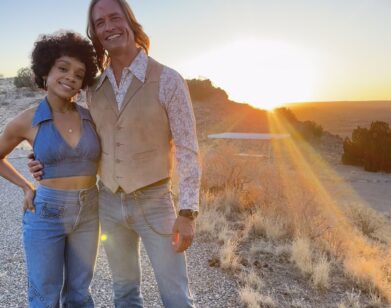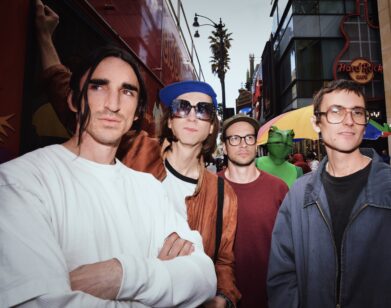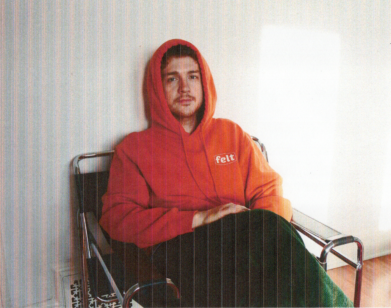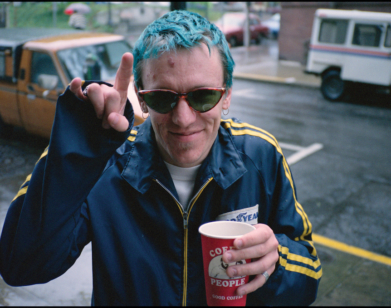DIIV’s New Chapter
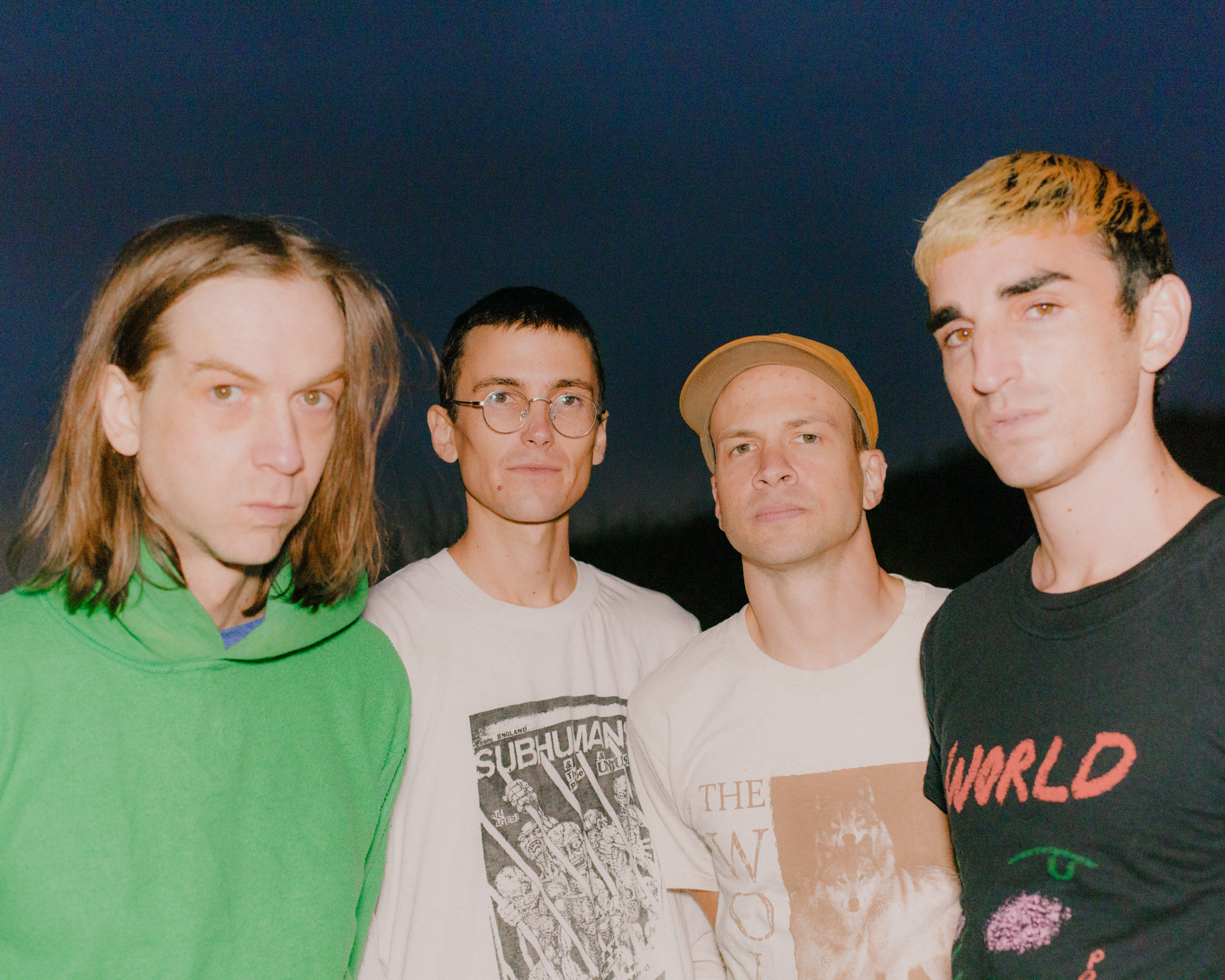
Let’s get this out of the way: It’s pronounced “dive.” Not to be confused with the Belgian industrial band which caused them to change their name, DIIV was formed in 2011 as the solo project of lead singer and guitarist Zachary Cole Smith. After recruiting musicians for the live show, Smith and company established themselves as critical darlings and bearers of the shoegaze torch with their 2012 debut Oshin. But soon after, Smith’s private struggle with heroin addiction spilled into public view when, in 2013, he and his then-girlfriend Sky Ferreira were arrested for drug possession. A few months earlier, multi-instrumentalist Colin Caulfield joined the band, and they eventually released Is the Is Are (2016), a sprawling, drifting record that faced Smith’s addiction—and attempted recovery—head on. Smith, who has been candid his addiction, in lyrics and in the press, characterized that record as “a light at the end of the tunnel” of his addiction, but that proved to be premature when in 2017, he announced that he was entering an inpatient treatment program. But that was then. Today, Smith finds himself on firmer ground, and the release of the group’s new album, Deceiver, reflects that. Interview connected with Smith and Caufield to talk about how recovery fits into their music, the rapidly changing music industry and DIIV’s new chapter.
———
SHAW: What are your thoughts about recovery being a part of your artistic narrative?
SMITH: It is a part of our narrative, whether we like it or not. A big thing for me is just realizing how universal that story is—my story’s not unique at all. And I think a lot of people —a lot of artists are getting comfortable with discussing their own personal issues in their music. And those issues a lot of times are universal, whether it’s mental health, or any kind of thing like that. Talking about my own recovery felt honest and relatable, because every person you know is affected by it, whether it’s a family member, a friend, whatever. It’s a very common thing that’s stigmatized. It’s important to not just talk about the weird bullshit rock mythology thing, but more of like, “Look, this is a fucking epidemic, and there are solutions to it. These are the solutions I’ve personally found.” That’s one of the things that we wrote about on the record, but it’s not the only thing that we’ve written about.
SHAW: Did recovery lead you into any sort of creative corners you wouldn’t have found otherwise?
SMITH: Yeah. A huge part of the process of us coming together as a band and being able to work like this came from having a process where we were all really open and honest with each other, from tools I learned in recovery about honesty, and removing ego from the equation. It’s been really inspiring. We all have a history together as friends and people. We can’t change the past, but work through it together, and the main way we found was just being honest, looking at our own character flaws and working to change those things so that we don’t repeat our past mistakes.
SHAW: Does your environment help your creativity?
SMITH: Yeah. I don’t think we were inspired by L.A.—or what people think about when they think of L.A.—but we found a really nice little community. Seeing what we had in New York, that disappeared as New York started to change.
SHAW: Is there any place that inspires you more, or do you write wherever you are?
SMITH: I think it’s just kind of like wherever you are. You’re always inspired by your environment, but it’s not like a specific, “We came to L.A. to soak up the vibes” or whatever.
SHAW: Do you pay attention to the critics?
CAULFIELD: I think it’s inevitable that you’re aware of what people are saying. I think especially with this record, we kept it really, really close. For a long time it was just the band who had heard any of the music we were working on and a couple friends who came by the studio. It was important for us to keep it intimate and just focus on the band for as long as we could. And then as time went on, we let other people in, like Sonny the producer, and Tyler the engineer. And then eventually when you finish a record, it goes out to so many people. It’s impossible not to be aware of it, but we try not to let it affect what we’re doing.
SMITH: You just make it and then put the record out in the world, and it lives on it’s own. You can’t control what people say about it—just make the best record you can. We made what we set out to make. That’s ultimately all we could control.
SHAW: Was it a different process from the last record?
CAULFIELD: Previously, Cole did almost everything himself in terms of writing. He was keeping it close to himself, because it’s a pretty isolated thing when you’re writing alone. This time around we were all in a room together so it felt considerably more open. But, it was still limited to the four of us, if that makes sense.
SHAW: What should we know going into the new record?
CAULFIELD: Choosing the singles was kind of challenging because the whole record is really diverse. Each song does something different, even though they’re all cohesive. The goal is that people listen to the whole record. When you put singles out to promote the album, you try to give a good impression of what that record does as a whole, but there’s a lot of surprises on the album. It gets really heavy, there’s huge dynamic shifts. I personally would want people to know that there’s a lot to listen to if you listen to the whole record.
SHAW: Do you guys find it difficult being in a band in this age of streaming?
CAULFIELD: Nah man, it’s hella easy.
SHAW: Why?
CAULFIELD: It’s challenging because I feel like there’s this newfound pressure to cater your music to streaming and have it be really immediate and even a bit chiller. A lot of music that gets really popular on streaming services is very chill. But in a certain sense, I feel like that expectation more than anything pushed us to make a weirder, heavier record. Just because we enjoy being a rock band. And I think DIIV for a long time got tagged as chill, dreamy music. For certain songs on the previous record, that is kind of the case, but we’ve always felt like a loud rock band when we play live.
SMITH: And ultimately, I think it seems like an easy thing to want to cater to the difference in music now. But I don’t think we would’ve been able to do that well, so the thing that we decided to do was just go more in the direction of still trying to be an album band—just make the best album we could and not really try to cater to the like RIYL algorithm. It doesn’t suit us as listeners, as music fans or as artists.
SHAW: The industry is changing faster than ever. Do you feel that pace?
CAULFIELD: Yeah, a little bit. I think all of this stuff we’re talking about is one of the reasons we wanted to make the writing and recording process so intimate. There’s just so much nowadays you get distracted by, and there’s so many temptations to water down your arch, or change it in any way.
SMITH: I think it’s a cool time to be a band that references a lot of music from the past, because I think people have different patterns for discovering music now. They could discover us, and then discover a bunch of older music based off of us. You don’t have these more linear ways of discovering music. A lot of times it works backwards for people, so I think it’s exciting to be a window into a world that younger people, or people who aren’t into rock music as much, might be interested in.
SHAW: What’s some of the older stuff that influenced this record?
CAULFIELD: There’s a bunch of different stuff like Bedhead and Duster, a lot of older slow-core we really enjoy. And then Smashing Pumpkins, or My Bloody Valentine for louder stuff. And then singer-songwriter stuff, like Elliott Smith. There was real diversity on the reference playlist. Some newer bands too, but that covers a lot of the older ones.
SMITH: We were pretty specific about what part of our own songs we wanted to reference things for. It was usually really specific about a certain guitar tone in a part, or how an arrangement will function. It was a little less like, “Let’s make a My Bloody Valentine song.” If you listen to Loveless for example, the biggest takeaway for us is, “Well, nobody can recreate that.” So there’s no point in trying. It was more like, “What’s the feeling this thing, or this part of the song gives me? How do we try to do that ourselves?”
SHAW: Is rock and roll dying?
SMITH: No. I just think music is cyclical and I think it’s really exciting. There’s a big window right now for a lot of new voices and new genres. I don’t think rock is dying, it’s just obviously not the mid ’90s and we’re not headlining Lollapalooza. That doesn’t mean there aren’t rock artists making really exciting music, it’s just not in the mainstream. But a lot of the best rock music from back then wasn’t in the mainstream either. Rock music for so long represented this ultimate, “You can do this too. You can buy a guitar at the store and make rock music.” Now, a lot of the other tools for making different types of music are so accessible to people, so it’s been democratized in that way, which is great, but I don’t think it necessarily represents the same thing it always did. Ultimately, this is the genre we’re working in. So if we were making a homemade electronic record or catering to whatever we think is cool, then we have no identity as an artist.

